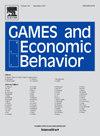最小稳定投票规则
IF 1
3区 经济学
Q3 ECONOMICS
引用次数: 0
摘要
在本文中,我描述了只有权力重要的社会的最小稳定投票规则和最小自稳定宪法(即投票规则对)。为此,我首先让玩家对投票规则的偏好概况满足权力分析中常用的四个自然公理:非支配性、匿名性、空玩家和摇摆玩家。然后,我提供了最小稳定和最小自稳定的简单概念,并表明最小稳定投票规则和最小自稳定宪法的家族相当小。最后,我得出结论,政党的发展是为了确保最低限度的自我稳定,否则就不是最低限度的自我稳定宪法。本文章由计算机程序翻译,如有差异,请以英文原文为准。
Minimal stable voting rules
In this paper, I characterize minimal stable voting rules and minimal self-stable constitutions (i.e., pairs of voting rules) for societies in which only power matters. To do so, I first let players' preference profiles over voting rules satisfy four natural axioms commonly used in the analysis of power: non-dominance, anonymity, null player, and swing player. I then provide simple notions of minimal stability and minimal self-stability, and show that the families of minimal stable voting rules and minimal self-stable constitutions are fairly small. Finally, I conclude that political parties have evolved to ensure the minimal self-stability of otherwise not minimal self-stable constitutions.
求助全文
通过发布文献求助,成功后即可免费获取论文全文。
去求助
来源期刊

Games and Economic Behavior
ECONOMICS-
CiteScore
1.90
自引率
9.10%
发文量
148
期刊介绍:
Games and Economic Behavior facilitates cross-fertilization between theories and applications of game theoretic reasoning. It consistently attracts the best quality and most creative papers in interdisciplinary studies within the social, biological, and mathematical sciences. Most readers recognize it as the leading journal in game theory. Research Areas Include: • Game theory • Economics • Political science • Biology • Computer science • Mathematics • Psychology
 求助内容:
求助内容: 应助结果提醒方式:
应助结果提醒方式:


